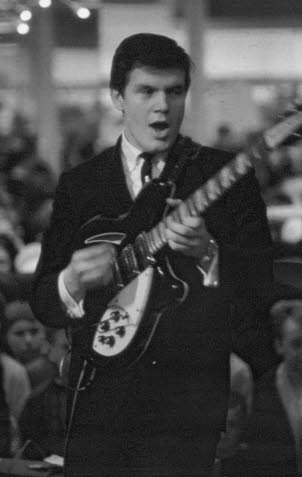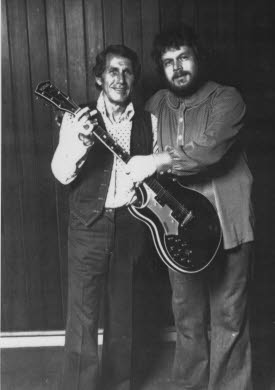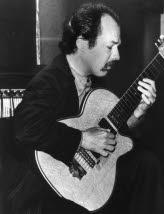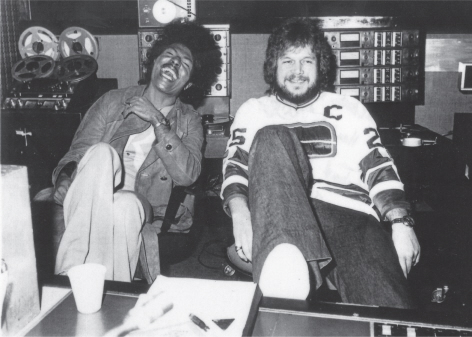Randy Bachman (17 page)
Authors: Randy Bachman's Vinyl Tap Stories
Tags: #Biography & Autobiography, #Composers & Musicians, #Genres & Styles, #Music, #Rock

We did more festivals down the West Coast, and at one of them the founding fathers of rock 'n' roll were booked to perform: Chuck Berry and Jerry Lee Lewis. On the afternoon of the final day, two Cadillacs pull up backstage. Chuck Berry is in one and Jerry Lee Lewis in the other. The doors to these Cadillacs are
wide open and the two start drinking. In those days the headliner appeared last, so they start arguing back and forth from their Cadillacs over who's going to close the show. Each is claiming to be the father of rock 'n' roll. They're arguing back and forth, and then their managers start arguing with each other. It's crazy.
Finally they decide to flip a coin. Jerry Lee Lewis loses the coin toss, so Chuck Berry will close the show. The implication was that Chuck, not Jerry Lee, was the king of rock 'n' roll. So the time comes for Jerry Lee to go onstage and he just goes crazy, pounding the keys of the grand piano like a wild man with his hair flying around. He's playing like crazy. Then, while his band plays on, he goes offstage and comes back with an axe and starts chopping the piano up. Splinters of wood and ivory are flying everywhere. He then pulls out a cigarette lighter and lighter fluid and proceeds to set the remains of the piano on fire. The crowd is going insane by this point. Before he walks offstage, Jerry Lee walks up to the microphone and says: “Nobody follows the Killer.” True to those words, Chuck Berry gets in his Cadillac and drives away without performing. Who could follow that anyway?
JOHN FOGERTY
In late 1969, the Guess Who played with Creedence Clearwater Revival at the Los Angeles Forum at a sold-out show. In the Top 10 in L.A. that week Creedence had four songs and the Guess Who had three. How amazing was that?! The two bands rocked the Forum that night.
In the dressing room before the show, I was noodling around playing my jazzy Lenny Breau licks. John Fogerty heard me playing and said, “Very cool stuff. Just don't play it on your records.” I've always remembered that. I always play a solo a fourteen-year-old kid thinks he can play when he hears it on the radio. He'll go out and buy the record and learn it. If it's all this weird complicated stuff, something way out or jazzy, he'll never buy that record. I always sing a solo first and then I play it. I make my solos very
melodic. If someone else can sing it, they can play it. I always think about that when writing and recording.
Lenny Breau taught me that the spaces are as important as the notes in a solo. Leave some holes and make people anticipate the next note. B.B. King told me that, too. What I learned from Lenny was a playing etiquetteânot to go berserk with a barrage of notes. I took that approach on my
JazzThing
album.
My Picks
“BE-BOP-A-LULA” by Gene Vincent and the Blue Caps
“BORIS THE SPIDER” by the Who (featuring John Entwistle)
“BROWN-EYED GIRL” by Van Morrison
“CALL ANY VEGETABLE” by the Mothers of Invention
“CROSSFIRE” by Johnny and the Hurricanes
“DA DO RON RON” by the Crystals
“EARLY MORNING RAIN” by Gordon Lightfoot
“FORTUNATE SON” by Creedence Clearwater Revival
“FORTUNE TELLER” by Bobby Curtola
“GREAT BALLS OF FIRE” by Jerry Lee Lewis
“HEYGOODE HARDY” by the Guess Who
“HITCH HIKER” by Bobby Curtola
“HOW HIGH THE MOON” by Les Paul and Mary Ford
“JOHNNY B. GOODE” by Chuck Berry
“LET IT RIDE” by BTO
“LIGHTFOOT” by the Guess Who
“LOTTA LOVIN'” by Gene Vincent and the Blue Caps
“OH BY JINGO” by Chet Atkins
“RED RIVER ROCK” by Johnny and the Hurricanes
“RUNAROUND SUE” by Dion and the Belmonts
“STONE FREE” by Jimi Hendrix
“SUMMERTIME” by Randy Bachman with Lenny Breau
“SWINGIN' SHEPHERD BLUES” by Moe Kaufman
“TAKING CARE OF BUSINESS” by BTO
“THESE EYES” by Junior Walker and the All Stars
“A WEDNESDAY IN YOUR GARDEN” by the Staple Singers
“WHEN FRIENDS FALL OUT” by the Guess Who
“WHITE RABBIT” by Jefferson Airplane
“WILD EYES” by the Stampeders
“YOU AIN'T SEEN NOTHING YET” by BTO
Shadows and Reflections
The first time I heard the distinctive melodic instrumental music of the Shadows I was instantly smitten. It was the beginning of a lifelong admiration for the group's intricate, guitar-driven sound. The U.K. quartet became my mentors, with Shadows lead guitarist Hank Marvin serving as my very own hero.
The story of how I fell in love with the Shadows starts with how I joined Allan and the Silvertones. Allan and the Silvertones were a popular group from the other side of the Red River in East Kildonan whose reputation had spread around the city. I first heard about them in around 1961. They needed a rhythm guitar player because the guy they had, Johnny Glowa, had quit to go back to school. He'd even sold his orange Gretsch 6120 guitar to Neil Young. So I was asked to audition on rhythm guitar; I guess they knew of me from the Velvetones. Allan Kowbel was playing lead guitar at the time. The group's repertoire consisted largely of material from England's Cliff Richard and the Shadows, whose guitar player was Hank Marvin. I'd never heard the Shadows until I met Allan. He gave me a couple of their EPs to learn from, which, I think, had “Kon Tiki,” “Man of Mystery,” “FBI,” and songs like that. They gave me a few days to learn the songs before my audition. Learning the chords was no problem, and the
melodies were a piece of cake for me, so I learned them too just for fun. With my background in melody from years of violin, moving on to the Shadows seemed natural.
Featuring Hank Marvin on lead guitar, Bruce Welch on rhythm guitar, drummer Tony Meehan (replaced by Brian Bennett), and Jet Harris on bass, the Shadows initially came together in 1958 as backing group for U.K. pop sensation Cliff Richard. Dubbed England's very own Elvis Presley, Cliff recorded and toured with the Shadows, whose two guitars, bass, and drums lineup became the template for British rock bands, including the Beatles. Beginning in 1960 with “Apache,” the Shadows carved out a separate career recording instrumentals, going on to score thirty-five chart hits on their own as well as charting almost as many times with Cliff Richard, making them the third most successful singles recording act in U.K. music history.
With his trademark Buddy Holly glasses and fiesta-red Fender Stratocaster (reputed to be the first Stratocaster in the U.K.), Hank Marvin became an inspiration to thousands of British teens who picked up guitars in the wake of their success. Hank's use of an echo effect and his vibrato arm on his guitar were integral to his sound. He'd seen James Burton playing a Fender Telecaster backing Ricky Nelson, and so, with no Fender dealers in the U.K. in 1959 and not knowing what else to do, he wrote away to Fender in California and sent money for a Telecaster. But what they sent him was a Stratocaster like the one Buddy Holly played and later Jimi Hendrix. Hank played it on every Shadows recording and on every record they made with Cliff Richard. Hank's fiesta-red Stratocaster is legendary.
At the next Silvertones rehearsal Allan was playing lead guitar and singing, with me just playing the chords for rhythm. In the middle of a song he broke a string, and so I immediately switched from rhythm to lead and finished the song. When it was done I thought that was it for me; I had stepped on his toes. The guys were all looking at me when Allan said, “It's so hard to play lead and sing at the same time. I'll just play rhythm. Randy, you're now the lead guitar player.” That was it. I was in the Silvertones. Since we patterned ourselves after the Shadows, we changed our name to the Reflections. Chad Allan was our Cliff Richard and we were like his Shadows.

Randy wearing an old, discarded Union Jack flag to look cool while opening the show at Winnipeg Arena for Jefferson Airplane in 1967. Randy didn't know that the next day was Remembrance Day and the photo became fodder for the newspapers, which claimed that an alderman's son had desecrated the flag.

Randy and his Rickenbacker guitar with the Guess Who at Winnipeg's Polo Park shopping mall, spring 1965.

Chet Atkins giving Randy a Gretsch Chet Atkins Super Axe in Vancouver, 1978, as consolation for the theft of Randy's orange 6120 Gretsch in Toronto.

Lenny Breau playing a seven-string Kirk Sand guitar.

